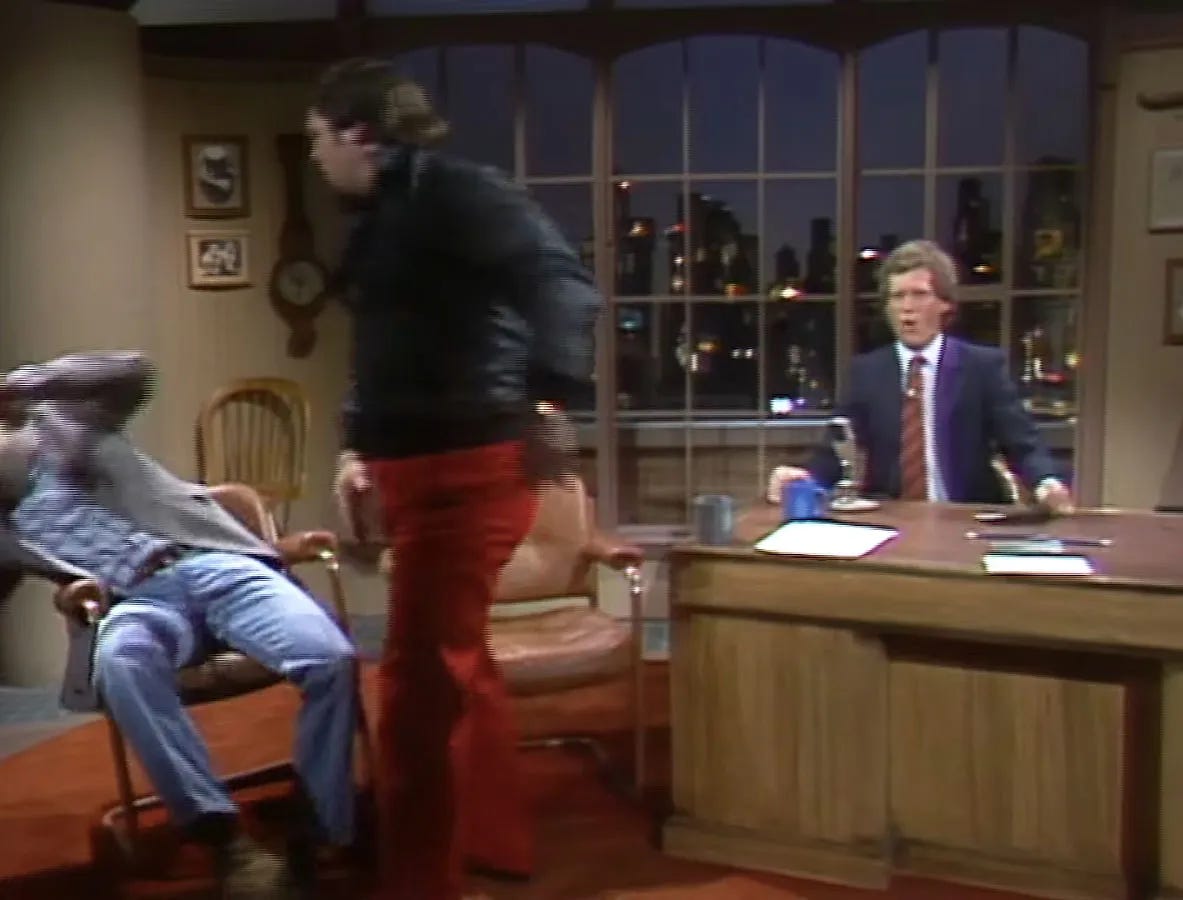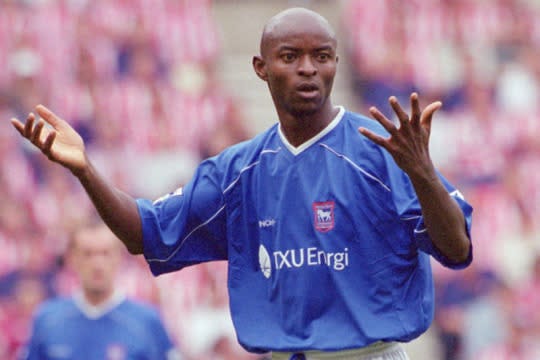In praise of in-jokes
The comedy of private worlds

There is generally no limit on the amount of laughs a comedian wants to get. The more, the better, which explains why a consistent form of consolation to the unlucky comedian, ‘People weren’t laughing, but they were really enjoying it!’ is of so little use. Laughs are everything to an act; if people enjoy your comedy, they signal through laughter.
Yet at the same time another approach to comedy runs alongside this need for mass adulation; the private joke, the minutely tailored comic moment, perhaps comprehensible to just two people1 in the world – and somehow only funnier because of its extreme parochialism. Indeed, when I think of the things that have really made me laugh in my life, it isn’t the slick gags of a stand-up special, however much I might admire them as comedy done well, but moments of private humour, linked to particular circumstances which, though they can be explained to others, inevitably lose something of their comic charm in doing so.
The first private joke I can remember being involved in was with a greengrocer in Beeston, a small market town adjacent to Nottingham. My Mum and I used to go there every Saturday as the place was small enough that I could have a bit of freedom without getting lost. I spent a lot of time at WH Smith’s there in the late 1980s; I can still remember the rows of cassettes now, each with its price stickered on.
Anyway, on the way back to the car park we would pass a greengrocer’s shop, at which the greengrocer upon seeing me would break into an animated chorus of ‘And there was a monster! A goblin! And a ghost!’ accompanied by animated gestures. Apparently I had once – and this bit I can’t remember – as a small child regaled the greengrocer with one of my fantastical and extremely violent stories – I was always making weird stuff up – and he’d been so amused by it that he’d taken it up as a running gag every time I saw him. He’d give me a flash of performed grand guignol, and I’d echo it back to him with horrified chokes and wild gesticulations.
Youth, given its near constant sociability, is a good time for in-jokes. I remember amusing friends on a train on the way back from London by pretending to be drunk to strangers. And it must have been on that same trip – I would have just turned exactly 18 – that I pulled off my greatest ever in-joke. We were walking as a large school party past the Cutty Sark when we saw some actors performing some kind of weird Elizabethan open-air theatre, at which point I stood before the group and said in a perfect French-accented English ‘We don’t know what you are doing but we think you are crazy!’ Therefore in an instant turning our whole group French. I think that’s the most Andy Kaufmanesque thing I ever did2.
As I came into early adulthood my in-jokes grew a little bit more sophisticated. A mate of mine, he one of my great mentors, had a shared running joke about the relatively unheralded 1994 biopic of TS Eliot, ‘Tom and Viv’. In this largely forgotten mid-90s video shop third option, the titular poet is played by Willem Dafoe. Asked in one scene whether he had prospects in life, Eliot replies with – I should mention that I have never viewed the film in question and may not be quoting accurately3 - ‘I have published a slim volume of poems.’ Well, that line became a marker for my friend and I of idleness and diffidence before the demands of the labour market. ‘What are you up to?’ ‘Just working on my slim volume of poems.’
We went further in the in the poetic in-joke stakes. Inspired by early 20th-century radical Scots poet Hugh MacDiamard, we even invented an early 20th century nationalist poet called Hugh McMarmite, famous for his ode to the slippers, ‘A Drunk Man Looks at a Baffie’4 and his collection ‘Baffies Across the Tay’; many hours of giggling were spent imagining and even writing works which would go into the eventual ‘McMarmite Festschrift’; we even invited friends to contribute.
In-jokes bond us, then. Another old friend and I have been sustaining a running joke with now since 2007 and the weekend of their Parisian stag do. The joke is that whenever we go anyway we are perennially just about to be joined by former Ipswich Town striker Finidi George, my friend being for his sins an Ipswich Town fan. Each time, through some bizarre contrivance, Finidi hasn’t been able to get there, with the situation attempting to be resolved by Andrew Townsend, former Villa and Ireland midfielder, inevitably driving the ‘tactics truck’ which featured in ITV’s brief period of presenting the Saturday night football highlights. Due to the joke’s Parisian origin, we often refer to said truck as the camion de tactique; in fact, I can still remember, on the first weekend this in-joke began, asking a French person to approach my friend and just say the words ‘Finidi George’. For some reason they didn’t.
Nonetheless fifteen years in the joke shows no real sign of flagging. Referencing it is a necessary prelude to our more serious chat of families, health and emotional states.

My favourite in-joke – the one which means most to me on the most different levels – happened just over ten years ago in Berlin. I used to perform a lot on the English-comedy scene there, with my little German-English bilingual act, and I had a friend, a fellow comic from England with a similar background in being English and knowing German – he had a great bit that the only advantage of knowing German was no longer finding those ‘Downfall’ parody videos funny.
Anyway, in Germany there is a small cluster of towns whose names double as verbs; Essen (to eat), Giessen (to pour), Siegen (to win). We began to refer to these places ‘as the verb towns’. And in a show we had a gag about the fate of a mid-ranking comedy career in Germany being to ‘play the verb towns.’
Now you have to be coming from a extremely specific position to find this in-joke droll. You have to perform comedy in Germany, you have to have learnt German as a foreign language and so notice the ‘verb towns’, and you need to be in minor showbusiness; once all those criteria are satisfied, the joke works for you. ‘Playing the verb towns’. What makes it so funny is to me is the highly specific and perhaps unrepeatable conditions which produced it and which it recalls; it was already odd, to be an anglophone comedian in Germany, but that joke made me feel less alone. It was a moment not just of bonding through comedy but of finding my people and the concept of ‘verb towns’ still makes me smile.
The in-joke or private joke represents a moment of creation of a shared comic language. Are these two things, the private joke and the in-joke, the same?
For me, the borders between the concepts are porous. An in-joke is the name we give to a joke which requires a certain amount of prior knowledge of a sector to get; works of public comedy are often criticized for containing too many in-jokes, e.g. jokes which a non-expert audience cannot be expected to understand. In this view, then, an in-joke is just the public performance of a private joke and can be divisive. Or unifying; I’d say catchphrase comedy has something of the scaled-up in-joke about it; you teach an audience a certain combinations of words and then get them to repeat them back. In a way, you are expanding the in-group signifier of the in-joke to something much wider; you are attempting to make a whole audience your private circle. You are offering a larger group of people the sense of being part of a clique, an approach very different of the ‘Everyman’ comedian, whose aim is to convince the audience that they are, in essence, one of them with a microphone.
There is, though, I think a distinction between the in-joke and the ‘private performance’, the kind of stunt Andy Kaufman or Gary Shandling used to pull. Such acts would go to elaborate lengths or adopt personae just to do visual gags or pranks for their friends or indeed own amusement. That attitude is wonderful and shows incredible commitment to the bit but there is still a spectator and an performer here, just reduced to the barest scale. This kind of japery can also bring us closer to the a more negative side of private amusement, the comedian who is ‘always on’. I once heard that John Cleese went for dinner with Peter Cook who regaled him with funny stories, voices and faces but left him in the end just left him wanting to ask ‘Great, but how are you?’
A shared private joke does the opposite. It opens up the space for dialogue rather than shutting it down. An in-joke, it seems to me, arises naturally between a small group of people at an incredibly specific moment of time and accrues layers of memory and variation as they turn it into a shared story. That’s maybe why in-jokes are so innately pleasurable; they have sociability and collaboration encoded within them. I don’t tell you an in-joke. We make one together.5
Enjoyed this? My novel, ‘Midlands’, is currently available as an e-book here for just £1. Buying a copy is a great way to support this newsletter. Alternatively, treat me to a Ko-Fi here.
Two people seems to be the minimum for a joke, not least because it doubles the chance of it being remembered.
Andy Kaufman being the situationist American comic famous for his work on the sitcom ‘Taxi’; this book details some of his wilder private jokes, often aimed at his fellow cast members. Kaufman’s comedy walks the line between his private amusement and an attempt to put over his worldview to a wider audience.
The trailer seems to indicate the quote is in fact ‘I have published one small book of poetry.’ Our version was funnier though.
This is a parody of MacDiarmid’s ‘A Drunk Man Looks at the Thistle’ (1926); ‘Baffie’ is a Scottish slang word for slipper or soft, comfortable shoe.
I don’t normally keep the comments open for non-paying subscribers but let me know below if you have any particularly funny in-jokes in your lives. Accepting, of course, that they inevitably lose something in the telling.


When visiting my parents, who are both old enough to have done Latin at grammar school, if Stav Danaos is doing the weather forecast, I can't resist saying "Timeo Danaos et weather ferentes!"
After the Brighton bomb an old woman was vox popped for TV news and she said how bad everything looked "what with the miners strike and everything". To this day my best friend and me say this about any trivial disturbance and it gets funnier over time.